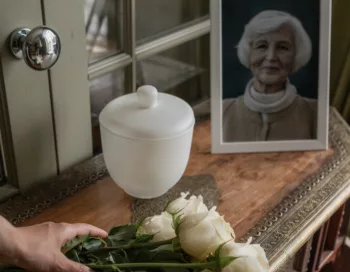In the UK, most funerals are cremations, rather than burials, with a funeral ceremony held in a crematorium. However, it is possible to hold a scattering of ashes ceremony at a later date, as well as, or instead of, a funeral.
Here we explain what these ceremonies involve, when and where they can be held, and how a humanist celebrant can help you plan a beautiful and meaningful ceremony to spread, scatter or inter the ashes of your person.

Why do people choose to hold a scattering of ashes ceremony?
There are many reasons you might choose to hold a ceremony to scatter ashes. Perhaps the funeral was large and formal, and you want a more intimate, personal opportunity for close friends or family to gather together to say a final farewell .
Maybe you chose an unattended cremation (also known as a direct cremation) instead of a funeral. This gives you the flexibility to hold a ceremony at a later date to say goodbye in your own way at a time of your choosing. You might choose a significant date to scatter the ashes, like the person’s birthday or the anniversary of their death.
A ceremony to scatter ashes can be extremely moving, especially if you choose a place that you love or which brings back memories of the person who has died. You can also hold a similar ceremony to accompany the burial, or interment, of ashes.
What is the difference between scattering and interring ashes?
Scattering ashes involves casting the ashes to the wind, over land or water, so that they are dispersed.
Interring ashes involves burying the ashes in the ground, often in a biodegradable urn, so that they rest in a permanent place.
How can a humanist celebrant help with a ceremony to scatter or inter ashes?
Our trained and accredited humanist celebrants can lead a ceremony to scatter ashes, whenever and wherever you choose.
Your celebrant will meet with you before the ceremony to find out about the person whose ashes you are scattering. They will ask questions to learn about that person’s life and legacy, and to understand the significance of the place you have chosen for the ceremony.
Together, you will develop a structure for the ceremony, and decide how different people will be involved. For example, you might ask your celebrant to scatter all the ashes, or different family members or friends might want to scatter a small amount each, and as they do so say a few words or share a memory.
As well as words of comfort and thoughts about life and death from your celebrant, you may also want to include readings or reflections from family members or friends.
Having a celebrant will help you focus on taking part in the ceremony, and be reassured that all the practical arrangements are in hand.
A humanist celebrant can create the atmosphere you want for the ceremony and take care of all the details. Your celebrant will have experience of similar ceremonies that they can draw on to help you create something which is right for you.
When can you hold a ceremony to scatter or inter ashes?

You will receive the ashes back from the crematorium a few days after the cremation. If you are working with a local funeral director, you will often collect them from their premises. If not, they may be delivered to you, or you may arrange to collect them from the direct cremation provider So, if you wish, you can hold a ceremony almost immediately.
However, many people prefer to wait weeks or months after their person’s death before scattering the ashes. This gives you time to decide where you would like to scatter them; to get any necessary permissions; and to find a convenient date, especially if friends or family are travelling long distances to attend.
There may also be practical reasons for holding a ceremony at a later date – for example, if you chose an outdoor location to spread the ashes, you might prefer a summer ceremony when the weather is likely to be better.
A ceremony can even take place many years after the person’s death. It could be on a significant anniversary or simply because it feels like the right time for you.
Where can you scatter ashes?
Many cemeteries and crematoria have gardens of remembrance where you can scatter ashes. However, you may wish to choose somewhere with more personal significance.
 You could choose a river or coastal location for a keen sailor or surfer, or find a quiet woodland spot to suit a nature lover. You might choose a place where the person loved to go on holiday; the sports ground where they watched their favourite team play; or the back garden where they entertained family and friends.
You could choose a river or coastal location for a keen sailor or surfer, or find a quiet woodland spot to suit a nature lover. You might choose a place where the person loved to go on holiday; the sports ground where they watched their favourite team play; or the back garden where they entertained family and friends.
As well as choosing somewhere meaningful, they are other practical things to think about. Is the place you’ve chosen accessible for everyone who wants to be there? How easy would it be to visit in the future if you wanted to? And, most importantly, are you allowed to scatter ashes there?
If you own the land – for example, your own garden – it’s easy: you do not need any special permission to scatter ashes there. However, if you choose to bury or inter the ashes, you will need to check your freehold and, if you move, let the new owner know.
If it’s private land or owned by a public body like a local council, you will need to check whether you can scatter ashes there, or whether you need to ask for permission first.
Scattering ashes in rivers, lakes or seas is permitted under government guidelines, as long as you don’t disturb other water-users and take care not to leave any wreaths, plastics or metals in the water.
The quantity and consistency of ashes may be different to how you expect – they are coarse and grainy, and can weigh between three and seven pounds. Concentrated ashes are not good for the soil as they have a very high pH level but they can be used to plant certain trees or flowers if you use a container.
What happens at a scattering or interment of ashes ceremony?
Each ceremony is different, because each person is different. There is nothing that you have to include in the ceremony, apart from scattering or interring the ashes themselves.
It doesn’t need to be a long ceremony – a few well-chosen words to accompany the spreading of ashes can be enough. However, you can also include readings, music and tributes, much like a memorial service or funeral ceremony.
A humanist celebrant will not only lead the ceremony itself, but they can also share ideas and help you choose what to include. Use our map to find a humanist funeral celebrant near you.





